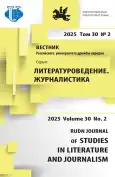Promotion of Chinese TV Series in Russia: Key Factors
- Authors: Song J.1,2, Xi L.3
-
Affiliations:
- Heilongjiang University
- Harbin University
- RUDN University
- Issue: Vol 30, No 2 (2025)
- Pages: 390-403
- Section: JOURNALISM
- URL: https://journal-vniispk.ru/2312-9220/article/view/319136
- DOI: https://doi.org/10.22363/2312-9220-2025-30-2-390-403
- EDN: https://elibrary.ru/KDOLHB
- ID: 319136
Cite item
Full Text
Abstract
In the context of increasing globalization, national audiovisual content is becoming an important tool for intercultural communication. The cultural exchange between China and Russia is marked by the growing interest in Chinese TV series in Russia, while the mechanisms of distribution of Chinese television series in the Russian market have not been reflected in the scientific field. The authors have identified specific strategies for promoting Chinese content and analyzed the perception of Chinese TV series by the Russian audience. The study was conducted in the context of China’s foreign cultural policy using Russian empirical data. The results demonstrate that the distribution of Chinese TV series in Russia largely depends on Chinese government support aimed at strategically promoting TV products abroad, as well as the use of a multi-channel content distribution model. This model includes the synergy of Chinese and Russian television channels, local streaming platforms, social networks, and international video services. This approach contributes to the progressive strengthening of the Chinese presence in the Russian media sphere and strengthening its influence on the Russian market. An analysis of data from the KinoPoisk portal shows a growing interest in Chinese TV series, which is reflected in an increase in the number of ratings and reviews, and high ratings. The key factors in genre and content policy are related to marketing aspects: responding to audience expectations, genre diversification, an emphasis on melodramas, fantasy and action films, and high-quality content. The authors offer counter recommendations for the promotion of television content in China, which can serve as a guideline for the effective distribution of Russian video products based on Chinese-Russian cultural cooperation.
About the authors
Jiamei Song
Heilongjiang University; Harbin University
Author for correspondence.
Email: songjiamei2016@gmail.com
ORCID iD: 0009-0005-4914-662X
SPIN-code: 2071-1078
Postdoctoral Researcher at the Postdoctoral Research Station of Foreign Languages and Literatures, Heilongjiang University; PhD in Philology, Lecturer, Harbin University
74 Xuefu St, Harbin, 150006, People’s Republic of China; 109 Zhongxing Ave, Harbin, 150086, People’s Republic of ChinaLin Xi
RUDN University
Email: 1042238016@pfur.ru
ORCID iD: 0009-0000-2093-8846
SPIN-code: 8888-6053
PhD Student, Department of Mass Communications
10 Miklukho-Maklaya St, bldg 2, Moscow, 117198, Russian FederationReferences
- Artamonova, U. (2020). American Cinema as an Instrument of the US Public Diplomacy. Analysis and Forecasting. IMEMO Journal, (2), 110–122. (In Russ.) https://doi.org/10.20542/afij-2020-2-110-122
- Bao, G. (2020). 包桂川, 《战斗民族养成记》之俄罗斯文化解析 [Analysis of Russian Culture in the TV Series ‘How I Became Russian’]. Art for the Masses, (11), 153–154. (In Chin.)
- Davis, S. (2021). What is Netflix Imperialism? Interrogating the Monopoly Aspirations of the ‘World’s Largest Television Network’. Information, Communication & Society, 26(6), 1143–1158. https://doi.org/10.1080/1369118X.2021.1993955
- Gorina, N.L. (2022). The Development of Streaming Video Platforms as a Cultural Phenomenon of Screen Arts. Bulletin of the Kazan State University of Culture and Arts, (3), 75–82. (In Russ.)
- Korzhunov, A., & Gomsin, A. (2012). Topic Modeling in Natural Language Texts. Proceedings of the Institute for System Programming of the RAS (Proceedings of ISP RAS), 23, 215–244. (In Russ.) https://doi.org/10.15514/ISPRAS-2012-23-13
- Li, K. (2023). Tongchou buzhu: Tengxun shipin jiji tuozhan haiwai shichang. 李凯晨. 统筹布局:腾讯视频积极拓展海外市场 [Coordination and planning: Tencent Video actively expands its overseas market]. Media, (2), 26–27. (In Chin.)
- Lixia, Z. (2021). The Place of Chinese Doramas in the Russian Socio-Cultural Landscape. Galactica Media: Journal of Media Studies, 3(4), 91–108. (In Russ.) https://doi.org/10.46539/gmd.v3i4.234
- Maltseva, A.S. (2024). The Phenomenon of Success of Streaming Series. Series in the System of Modern Media. Proceedings of the IV All-Russian Youth Scientific and Practical Conference (pp. 94–98). Moscow: VGIK Publ. (In Russ.)
- Mirzieva, L.R., Takhtaryova, S.S., & Kulikova, E.N. (2020). Mitigative Specific of Verb Replication in Chinese Language (on the example of the TV-series We are together). Kazan Linguistic Journal, (4), 385–411. (In Russ.) https://doi.org/10.26907/2658-3321.2020. 3.4.385-411
- Newcomb, H. (1974). TV: The Most Popular Art. Garden City; Anchor Press.
- Park, J.H., Kim, K.A., & Lee, Y. (2023). Netflix and Platform Imperialism: How Netflix Alters the Ecology of the Korean TV Drama Industry. International Journal of Communication, (17), 72–91.
- Sirota, L.V., & Kraevskaya, I.O. (2023). Medical terminology in the Chinese series ‘Surgeons’ and ways of its translation into Russian. Modern Oriental Studies, 5(4), 58–66. (In Russ.)
- Tanter, M.L. (2024). How Netflix and “Platform Imperialism” Compromise the Korean Drama Industry. In Y. Kim, D.L. Jayasinghe, H. Aleem, & K.A. Ritzenhoff (Eds.), Contemporary Asian Popular Culture, 2, 53–82. https://doi.org/10.1007/978-3-031-72178-6_3
- Van, S. (2019). 王晓娟, 中国电视剧对俄传播现状与策略 [The Current State and Strategy of Distribution of Chinese TV Series in Russia]. Chinese Television, (8), 96–100. (In Chin.)
- Volkova, I.I. (2018). Streaming and Live Streaming: Two Hypostases of the Same Phenomenon. Materials of the IX All-Russian Scientific and Practical Conference. Mass Communication Media in a Multipolar World: Problems and Prospects (pp. 208–211). Moscow: RUDN University Publ. (In Russ.)
- Yang, X. (2023). 杨向华. 流媒体平台开展国际传播路径分析—爱奇艺的出海策略与实践 [Analysis of international distribution paths of streaming platforms: Strategy and practice of iQIYI’s overseas expansion]. Media, (4), 50–51. (In Chin.)
- Zhao, W. (2021).赵卫防, 苏联/俄罗斯影视剧在中国的传播及启示 [The dissemination of Soviet and Russian films and TV series in China: experience and prospects]. Chinese Art Studies, (10), 106–115. (In Chin.)
- Zhao, Y. (2017). 赵毅衡, 哲学符号学:意义世界的形成 [Philosophical Semiotics: Shaping the World of Meaning]. Sichuan University Press. (In Chin.)
Supplementary files









